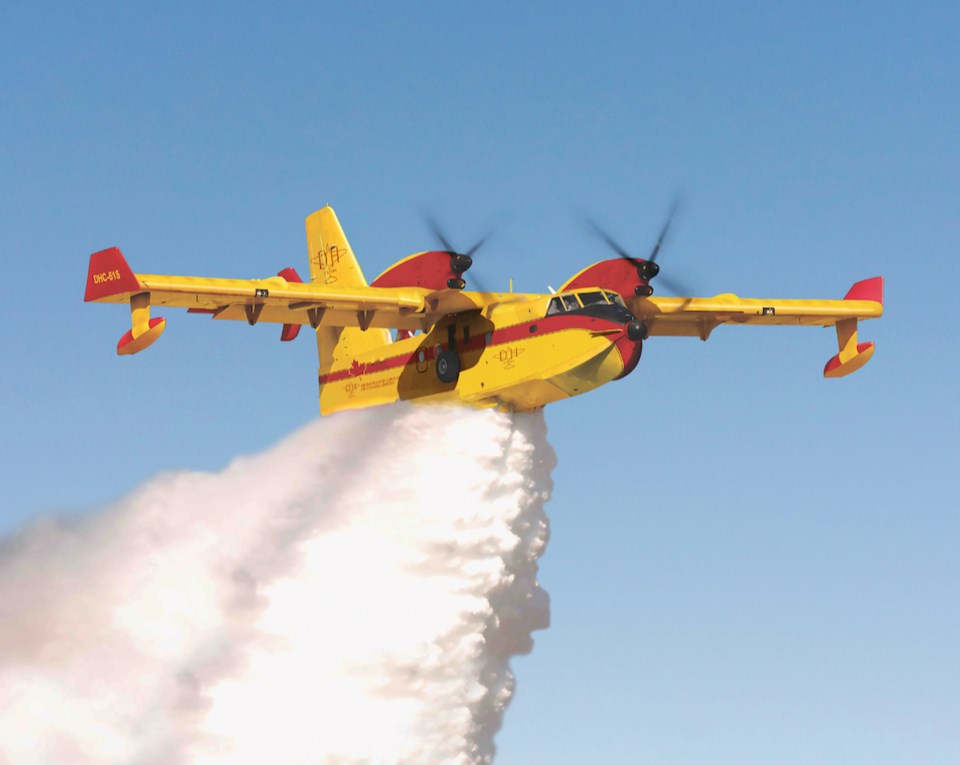NEWS
Wheatland County helps define future of southern Alberta

The Dash 8-400 is among the aircraft that will be built at a new 1,500-acre De Havilland manufacturing plant in Wheatland County.De Havilland Aircraft of Canada Ltd.
On January 12, 2023, in Vancouver, Terry Hui, CEO of Concord Pacific and Allan Adam, Chief of Alberta’s Athabasca Chipewyan First Nation (ACFN) announced the completion of a $143 million solar energy project anchored in a trio of towns in southern Alberta.
The solar farms in Coaldale, Monarch and Vulcan opened with traditional Indigenous ceremony in November 2022 and aim to significantly increase Alberta’s production of renewable energy, help Canada address its climate change goals, and reduce stress on Alberta’s electricity market, which experienced periods of record high pricing last year.
“ACFN has proven to be a valuable partner. They have the sophistication and financial ability in handling large and complex transactions, typically undertaken by institutional investors,” Hui said.
“We are very impressed with the AFCN,” a Concord spokesman confided to Western Investor, noting that the Indigenous group raised $32 million in funding to kickstart the project without a dime of government money.
“This is a merchant operation and the solar power generated will be sold on the open market,” he added.
Collectively, the three photovoltaic solar farms in southern Alberta cover approximately 480 acres and have 67.6 megawatts (MW) of generating capacity, enough to power 47,000 homes.
It is expected the project will deliver an annual output of 150 gigawatt hours (GWh) to the Alberta power grid as a merchant operation. With the 2023 completion of battery storage now under construction, the three facilities will capture about 26 GWh of electricity annually, according to Concord Green Energy, a wholly owned subsidiary of real estate developer Concord Pacific.
The AFCN, whose 1,280 members reside primarily in Fort Chipewyan, Fort McMurray, Edmonton and Fort Smith, is also active in the oil industry.
“The oilsands industry is an important part of our economy and creates jobs and revenue for our people, but the world is changing, and everyone has to use clean energy that doesn’t pollute and cause climate change to spin out of control,” said Chief Adam.
Through Concord Green Energy, Concord Pacific been in the clean energy sector for 12 years through numerous hydro, solar, and wind projects in British Columbia, Saskatchewan, Ontario, and Alberta. Collectively, Concord Green Energy projects currently generate enough energy to power every residence in Vancouver’s core, the company claims.
Wheatland lands De Havilland
A new aircraft manufacturing facility just east of Calgary is said to be a “game-changer” for the economy of southern Alberta and Wheatland County, which has been chosen by De Havilland Aircraft of Canada Limited as the site of its new plant.
De Havilland Field will consist of a new, state-of-the-art aircraft assembly facility, runway, parts manufacturing and distribution centres and maintenance repair and overhaul centre. In addition, educational space for workforce training is planned as well as general office buildings and a De Havilland Canada aircraft museum.
“This is a huge announcement for the Alberta economy, a game-changing investment for Alberta manufacturing and our burgeoning aviation sector,” said former Alberta premier Jason Kenny at the time of the 2022 announcement.
De Havilland Field will be the site of final assembly for the DHC-515 Firefighter aircraft, which was launched earlier this year, the DHC-6 Twin Otter as well as the Dash 8-400 aircraft. The company is currently working towards bringing the DHC-6 Twin Otter and Dash 8-400 aircraft back into production.
The new De Havilland Field will have access to a large, young and diverse labour pool in Alberta, and a world-class international airport at Calgary that can support efficient parts distribution to a global customer base, according to a company statement.
“We anticipate that once in full operation, there will be up to 1500 jobs located at De Havilland Field,” the statement added.
De Havilland said it has purchased nearly 1,500 acres hectares of land in Wheatland County, which has a population of about 9,000 people.
Construction could begin as early as this year, with its first buildings operational by 2025, though the project’s full build-out could take years.
The Wheatland operations would complement De Havilland’s current parts manufacturing facilities in Victoria, B.C. and its new engineering and customer support centre in Toronto, the company noted.
